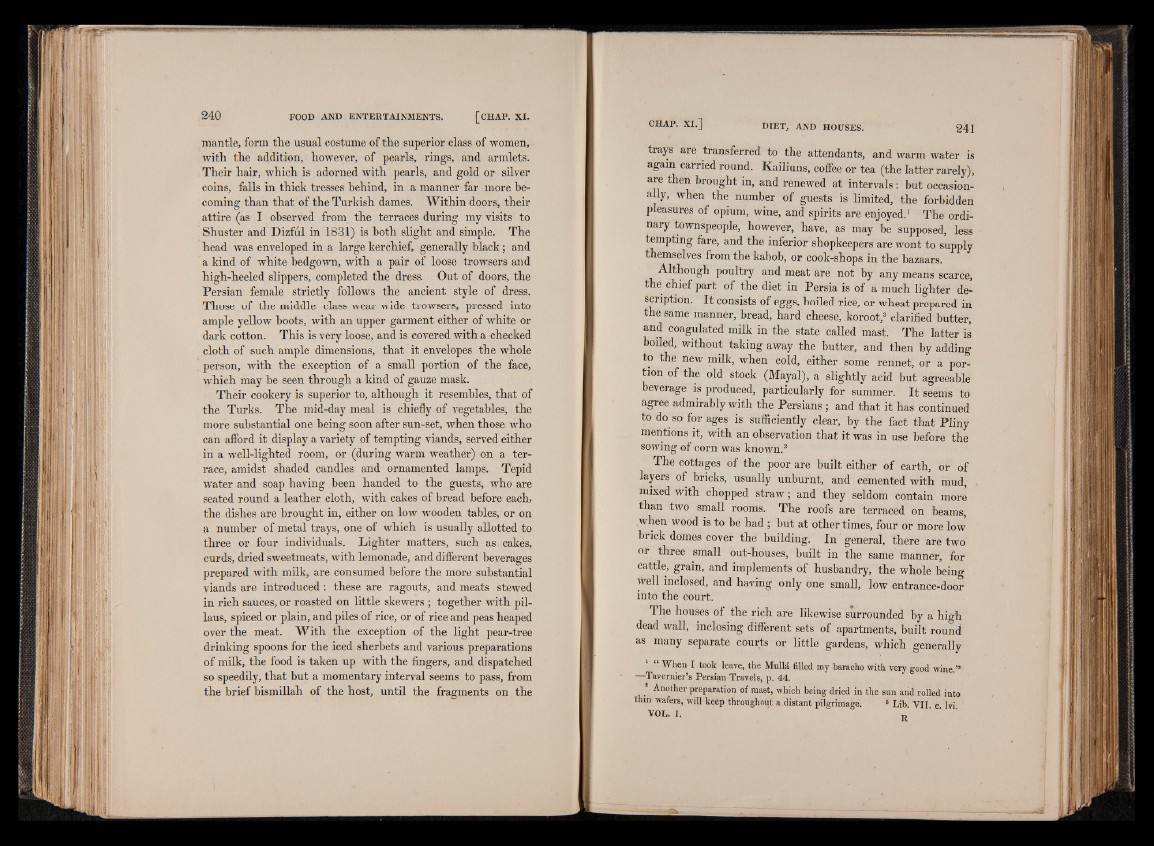
mantle, form the usual costume of the superior class of women,
with the addition, however, of pearls, rings, and armlets.
Their hair, which is adorned with pearls, and gold or silver
coins, falls in thick tresses behind, in a manner far more becoming
than that of the Turkish dames. Within doors, their
attire (as I observed from the terraces during my visits to
Shuster and Dizful in 1831) is both slight and simple. The
head was enveloped in a large kerchief, generally black ; and
a kind of white bedgown, with a pair of loose trowsers and
high-heeled slippers, completed the dress. Out of doors, the
Persian female strictly follows the ancient style of dress.
Those of the middle class wear wide trowsers, pressed into
ample yellow boots, with an upper garment either of white or
dark cotton. This is very loose, and is covered with a checked
cloth of such ample dimensions, that it envelopes the whole
person, with the exception of a small portion of the face,
which may be seen through a kind of gauze mask.
Their cookery is superior to, although it resembles, that of
the Turks. The mid-day meal is chiefly of vegetables, the
more substantial one being soon after sun-set, when those who
can afford it display a variety of tempting viands, served either
in a well-lighted room, or (during warm weather) on a terrace,
amidst shaded candles and ornamented lamps. Tepid
water and soap having been handed to the guests, who are
seated round a leather cloth, with cakes of bread before each,
the dishes are brought in, either on low wooden tables, or on
a number of metal trays, one of which is usually allotted to
three or four individuals. Lighter matters, such as cakes,
curds, dried sweetmeats, with lemonade, and different beverages
prepared with milk, are consumed before the more substantial
viands are introduced: these are ragouts, and meats stewed
in rich sauces, or roasted on little skewers ; together with pil-
laus, spiced or plain, and piles of rice, or of rice and peas heaped
over the meat. With the exception of the light pear-tree
drinking spoons for the iced sherbets and various preparations
of milk, the food is taken up with the fingers, and dispatched
so speedily, that but a momentary interval seems to pass, from
the brief bismillah of the host, until the fragments on the
trays are transferred to the attendants, and warm water is
again carried round. Kailiuns, coffee or tea (the latter rarely),
are then brought in, and renewed at intervals: but occasion-
a ly, when the number of guests is limited, the forbidden
pleasures of opium, wine, and spirits are enjoyed.1 The ordinary
townspeople, however, have, as may be supposed, less
tempting fare, and the inferior shopkeepers are wont to supply
themselves from the kabob, or cook-shops in the bazaars.
Although poultry and meat are not by any means scarce,
the chief part of the diet in Persia is of a much lighter de-
scriptidn. It consists of eggs, boiled rice, or wheat prepared in
the same manner, bread, hard cheese, koroot,2 clarified butter,
and coagulated milk in the state called mast. The latter is
boiled, without taking away the butter, and then by adding
to the new milk, when cold, either some rennet, or a portion
of the old stock (Mayal), a slightly acid but agreeable
beverage is produced, particularly for summer. It seems to
agree admirably with the Persians ; and that it has continued
to do so for ages is sufficiently clear, by the fact that Pliny
mentions it, with an observation that it was in use before the
sowing of corn was known.3
The cottages of the poor are built either of earth, or of
layers of bricks, usually unburnt, and cemented with mud,
mixed with chopped straw; and they seldom contain more
than two small rooms. The roofs are terraced on beams,
.when wood is to be had ; but at other times, four or more low
brick domes cover the building. In general, there are two
or three Small out-houses, built in the same manner, for
Cattle, grain, and implements of husbandry, the whole being
well inclosed, and having only one small, low entrance-door
into the court.
The houses of the rich are likewise surrounded by a high
dead wall, inclosing different sets of apartments, built round
as many separate courts or little gardens, which generally
When I took leave, the Mulld filled my baracho with very good wine.”
—Tavernier’s Persian Travels, p. 44.
’ Another preparation of mast, which being dried in the sun and rolled into
thin wafers, will keep throughout a distant pilgrimage. 8 Lib. VII. c. lvi.